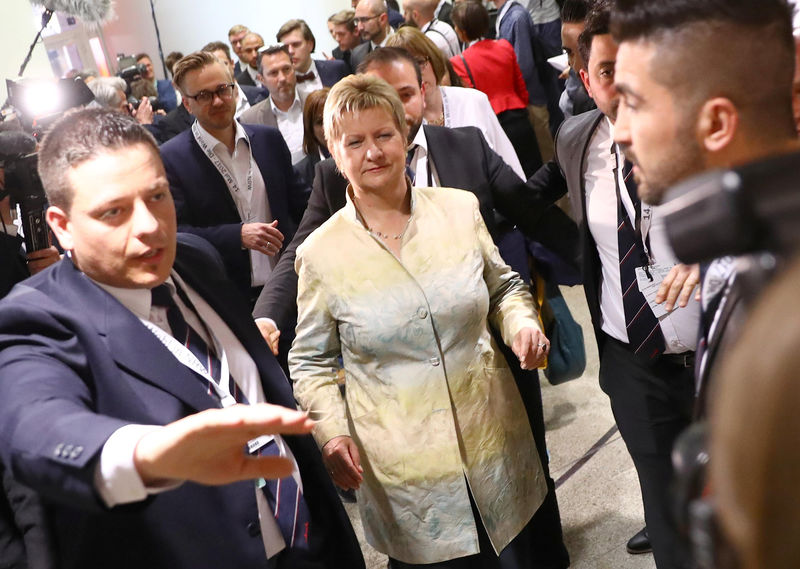By Michelle Martin
BERLIN (Reuters) - Once a self-styled "anti-party party", Germany's environmentalist Greens have been plunged into crisis by the very success that brought them into the political establishment.
The former fringe group appears to have turned off many voters by shifting towards the centre, and its collapse in popularity could complicate coalition arithmetic after a Sept. 24 national election. Chancellor Angela Merkel is on track to return to power but will almost certainly need a coalition ally.
The Greens' top candidates are pragmatists seen as open to an alliance with Merkel's conservatives. But the slump in their poll ratings by around half since last summer, to 6-8 percent, makes that constellation unlikely.
The Green's problems crystallised in two votes this year: in March, when they crashed out of the state assembly in the Saarland, and on Sunday, when they only just scraped back into parliament in the populous state of North Rhine-Westphalia.
"Perhaps the Greens need to become a bit more rebellious and unconventional again," said veteran Greens MP Hans-Christian Stroebele, 77, a lawyer who made his name in the 1970s defending militants of the Red Army Faction urban guerrilla group.
The environmental party was born in 1980, growing out of the ecologist movement of the late 1960s and 1970s. Some Greens won seats in the national parliament for the first time in 1983 - and in those days, some knitted in parliament.
The party tasted power at national level in a 1998-2005 tie-up with the Social Democrats (SPD), and could team up with either Merkel's conservatives, or the SPD and the far-left Linke, after September's election.
But the Greens' plunge in the polls suggests neither of those alliances would command a parliamentary majority. That could force the largest party bloc - probably Merkel's conservatives - to team up with two allies rather than one.
A senior official from Merkel's conservatives said the chancellor had wanted to leave open the possibility of a tie-up with the Greens but that was now doubtful because "they have no candidates and no issues".
BROKEN TABOO
The party holds seats in 14 of Germany's 16 regional assemblies, and in three states has broken its former taboo against forming alliances with conservatives. Its first state premier said during the migrant crisis he prayed for Merkel every day.
Supporters complain the Greens have become too normal and too boring, said Thomas Petersen of the Allensbach Institute. A survey found 13 percent consider the party "cool", down from 59 percent seven years ago.
The Greens are partly victims of their own success; their environmentalist agenda has become mainstream.After Japan's 2011 Fukushima disaster, they boasted as much as 28 percent support. But Merkel's decision then to turn away from nuclear power robbed the Greens of a key rallying point. Multiculturalism, another party cause, has also advanced.
A recent survey by pollster Forsa found half of Germans would not miss the environmental party if it ceased to exist.
"At the moment they lack something that makes supporters say: that's why we need the Greens," said Berlin-based political analyst Gero Neugebauer.
"A lot of people think the Greens are a bit schoolmarmish and have a know-it-all attitude - they see them as people who want to tell us what to eat, and how to travel to work, and this lecturing attitude annoys people."
The Greens caused outrage during the 2013 election campaign by proposing some canteens introduce a weekly vegetarian day. More recently, the party has upset some drivers by proposing a higher tax on cars that are not environmentally friendly.
Commentators also link the party's weakness to its top election candidates - Katrin Goering-Eckardt and Cem Ozdemir, the first politician of Turkish origin to win a seat in the national parliament. Both are aged 51 and party veterans.
"Neither represent a Green revival," said Neugebauer.
Goering-Eckardt admitted the party was struggling.
"We can and will change the situation," said the softly spoken Lutheran, who grew up in the former Communist East.
To do well in September's election, the Greens may need something they do not want, said Manfred Guellner, head of the Forsa polling institute.

"There's not enough time for much to happen there - unless there's another Chernobyl or Fukushima," he said.